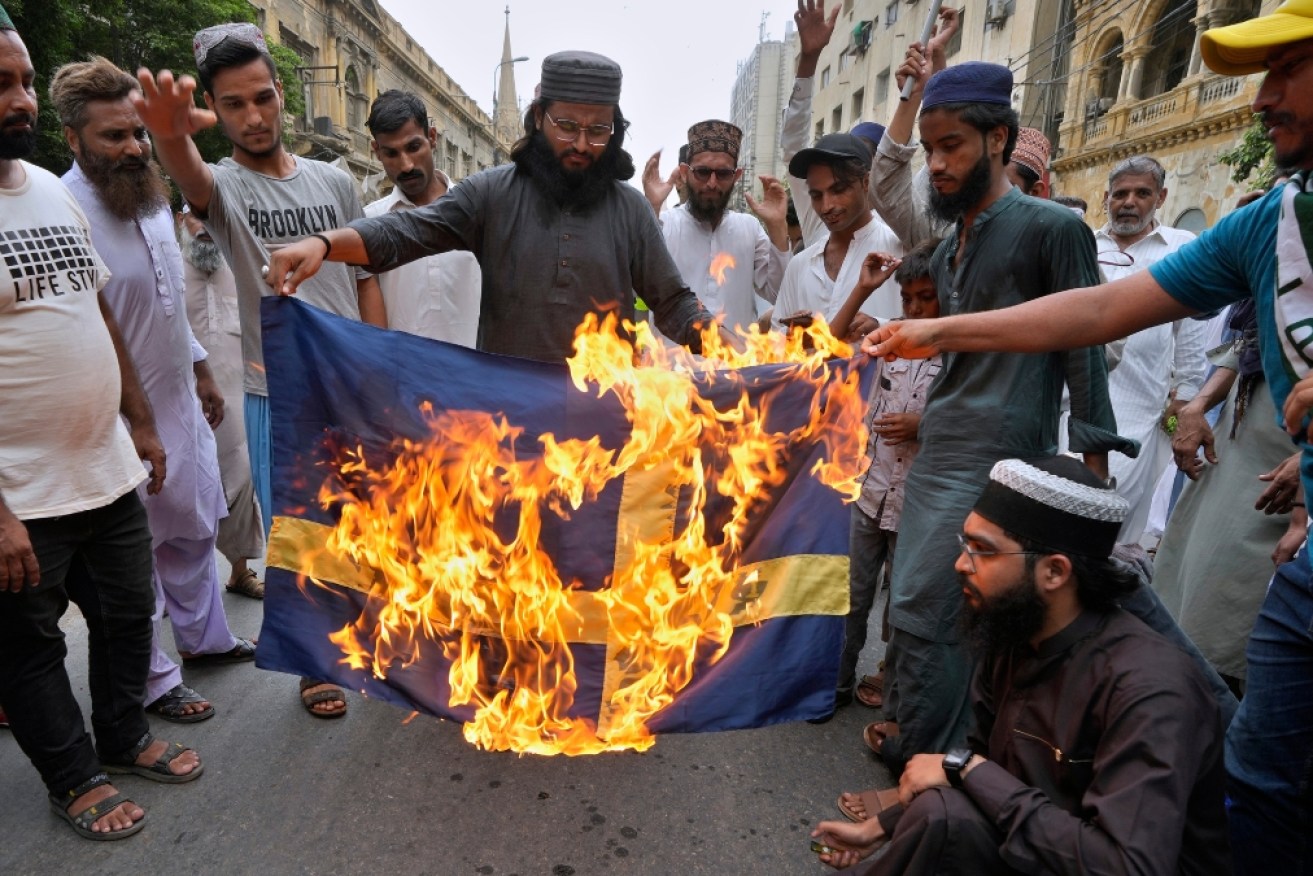Warning to Aussies as Sweden’s terror threat grows


Supporters of a radical Islamist party in Pakistan burn the Swedish flag during a rally to condemn the burning of the Koran in Sweden. Photo: AAP
The Australian government has issued an urgent warning for tourists to be extremely careful when travelling to Sweden.
The government’s Smartraveller website has been updated to warn Australian travellers they should “exercise a high degree of caution in Sweden” due to the threat of terrorism.
Although travel to Sweden has not been discouraged outright, Smartraveller advises travellers to “maintain a high level of vigilance in public spaces”.
The upgraded threat level comes after months of mounting tensions in the Scandinavian nation over public burnings of the Koran, the central Islamic religious text.
The Koran is sacred to Muslims, who consider damage to the text as an insult to Islam and God.
The public desecration of the texts, permitted by Swedish courts and police, has been condemned by members of the Muslim community and countries such as the US and Turkey.
Sweden’s self-assessed terrorist threat level has sat at level three, or “elevated threat”, since 2010, but the country’s counter-terrorism organisation announced last month the reactions to the desecration of the holy texts have “worsened the security situation”.

Protester Salwan Momika was watched by a Swedish police officer as he kicked a copy of the Koran during a demonstration outside the Iraqi embassy in Stockholm. Photo: AAP
“The actions carried out, and already ongoing disinformation campaigns, have affected Sweden’s image from that of being a country of tolerance to a country hostile to Islam and Muslims, a country where attacks against Muslims are sanctioned by the state, and where Muslim children can be kidnapped by social services,” the Swedish Security Service said in a statement.
“As a whole, this may increase the threat posed by individuals in the violent Islamist environment.”
Speaking in Stockholm earlier this month, Swedish Prime Minister Ulf Kristersson accused outsiders of exploiting the country’s freedom of expression laws and using them as “a stage for spreading hateful messages”.
“We are in the most serious security policy situation since the Second World War,” he said in a statement posted to Instagram.
Swedish courts defend freedoms
This year has seen a number of Koran burnings in Sweden, after the courts overruled police rejections of applications for the public demonstrations where the burnings occurred.
The courts argued the demonstrations did not have clear links to security risks, and not allowing them to take place would infringe on freedom of speech.
Sweden abolished blasphemy laws in the 1970s, and the country’s constitution guarantees the right to freedom of expression on any subject, including opinions that question religious messages or that can be perceived as hurtful to believers.
Critics of the courts’ decision to allow public desecration of the Koran have pointed out Sweden has a law prohibiting incitement against ethnic groups, but others argue Koran burnings target the book, not people.
Since the courts’ decision was handed down earlier this year, Swedish police have given permission for several public demonstrations centred around damaging the Koran, which have been attended by uniformed officers.
In June, Iraqi refugee and prolific demonstrator Salwan Momika tore up and burned a copy of the Koran outside a Stockholm mosque in front of hundreds of onlookers on the first day of Eid in a police-approved demonstration, with police officers watching on.
Police later charged Mr Momika for agitation against an ethnic or national group and violating the city’s ban on fires, but he and frequent co-demonstrator Salwan Najem were still able to hold a similar demonstration in front of the Royal Palace in Stockholm this month.
Political fallout
Mr Kristersson has described the recent acts as legal, but not appropriate.
He said in a statement posted on Instagram that his government is analysing the legal situation regarding desecration of the Koran and other holy books due to the backlash stirring against Sweden.
Mr Kristersson’s comments come as Sweden’s application to join NATO hinges on the approval of Hungary and Muslim-majority country Turkey; the latter has slammed the Swedish demonstrations.
Tweet from @MiddleEastMnt
Muslim outrage
In June, tensions reached boiling point in Iraq, with dozens of people storming Baghdad’s Swedish embassy in protest over the continued demonstrations in Sweden.
The following month, the leader of Lebanon’s political and militant group Hezbollah said if governments of Muslim-majority nations do not act against countries that allow the desecration of the Koran, Muslims should “punish” those who facilitate attacks on Islam’s holy book.
Denmark, which also saw a string of public Koran desecrations by anti-Islam activists this year, is looking to make it illegal to desecrate the Koran or other religious holy books in front of foreign embassies in the country.
Danish Foreign Minister Lars Løkke Rasmussen said the burning of holy scriptures “only serves the purpose of creating division in a world that actually needs unity”, but acknowledged finding a legal tool to ban these acts without compromising freedom of expression would not be easy.
“There must be room for religious criticism, and we have no thoughts of reintroducing a blasphemy clause,” he told Danish public broadcaster DR.
“But when you stand up in front of a foreign embassy and burn a Koran, or burn the Torah scroll in front of the Israeli embassy, it serves no other purpose than to mock.”








